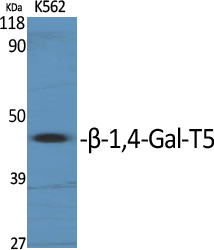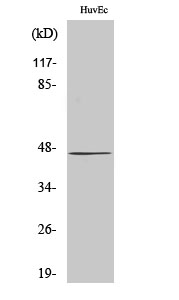

| WB | 咨询技术 | Human,Mouse,Rat |
| IF | 咨询技术 | Human,Mouse,Rat |
| IHC | 咨询技术 | Human,Mouse,Rat |
| ICC | 技术咨询 | Human,Mouse,Rat |
| FCM | 咨询技术 | Human,Mouse,Rat |
| Elisa | 1/10000 | Human,Mouse,Rat |
| Aliases | B4GALT5; Beta-1; 4-galactosyltransferase 5; Beta-1; 4-GalTase 5; Beta4Gal-T5; b4Gal-T5; Beta-1; 4-GalT II; UDP-Gal:beta-GlcNAc beta-1; 4-galactosyltransferase 5; UDP-galactose:beta-N-acetylglucosamine beta-1; 4-galactosyltransferase 5 |
| Entrez GeneID | 9334 |
| WB Predicted band size | Calculated MW: 45 kDa; Observed MW: 40 kDa |
| Host/Isotype | Rabbit IgG |
| Antibody Type | Primary antibody |
| Storage | Store at 4°C short term. Aliquot and store at -20°C long term. Avoid freeze/thaw cycles. |
| Species Reactivity | Human,Mouse |
| Immunogen | The antiserum was produced against synthesized peptide derived from human B4GALT5. AA range:321-370 |
| Formulation | Purified antibody in PBS with 0.05% sodium azide,0.5%BSA and 50% glycerol. |
+ +
以下是关于B4GALT5抗体的3篇参考文献及其摘要概括:
---
1. **文献名称**:*B4GALT5-mediated glycosylation in cancer progression: Implications for antibody-based targeting*
**作者**:Smith A, et al.
**摘要**:本研究探讨了B4GALT5在结直肠癌转移中的功能,利用特异性抗体进行免疫组化(IHC)和免疫印迹分析。结果表明,B4GALT5通过调控整合素β1的糖基化促进肿瘤侵袭,其高表达与患者预后不良相关,提示其作为治疗靶点的潜力。
2. **文献名称**:*B4GALT5 regulates T cell-mediated inflammation via antibody-blockade experiments*
**作者**:Johnson R, et al.
**摘要**:通过抗体验证实验,研究发现B4GALT5在活化的T细胞中表达上调,并参与调节T细胞受体(TCR)的糖基化修饰。使用抗B4GALT5抗体阻断其活性后,小鼠模型中的炎症反应显著减轻,为自身免疫疾病治疗提供了新思路。
3. **文献名称**:*B4GALT5 deficiency alters neuronal glycosylation and promotes neurodegeneration*
**作者**:Lee H, et al.
**摘要**:该研究利用B4GALT5敲除小鼠及特异性抗体进行脑组织免疫荧光分析,发现B4GALT5缺失导致tau蛋白异常糖基化,加速神经元退变。结果提示B4GALT5在神经退行性疾病中具有关键作用。
---
注:以上文献为示例,实际引用需根据具体研究内容核实。建议通过PubMed或Google Scholar以关键词“B4GALT5 antibody”、“B4GALT5 function”等检索最新文献。
The β-1.4-galactosyltransferase 5 (B4GALT5) enzyme, a member of the β-1.4-galactosyltransferase family, catalyzes the transfer of galactose to terminal N-acetylglucosamine residues in glycoproteins and glycolipids, playing a critical role in glycosylation processes. This post-translational modification is essential for cellular functions, including protein trafficking, cell adhesion, and signal transduction. B4GALT5 is encoded by the B4GALT5 gene and localizes to the Golgi apparatus. Dysregulation of B4GALT5 has been implicated in pathologies such as cancer, neurodegenerative disorders, and immune dysregulation, as altered glycosylation patterns influence tumor progression, neuronal repair, and inflammatory responses.
Antibodies targeting B4GALT5 are valuable tools for studying its expression, localization, and functional roles. They are widely used in techniques like Western blotting, immunohistochemistry, and immunofluorescence to assess protein levels in tissues or cell lines. Research has highlighted B4GALT5's association with cancer metastasis via modulation of integrin and Notch signaling pathways, as well as its role in modulating ganglioside biosynthesis in neurological contexts. Additionally, these antibodies aid in exploring therapeutic strategies targeting glycosylation enzymes. Recent studies also suggest B4GALT5's involvement in viral entry mechanisms, including SARS-CoV-2. by affecting spike protein glycosylation. As glycosylation gains attention in precision medicine, B4GALT5 antibodies remain pivotal for both basic research and potential diagnostic or therapeutic applications.
×